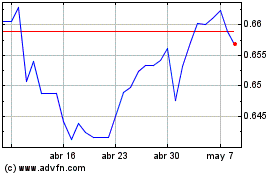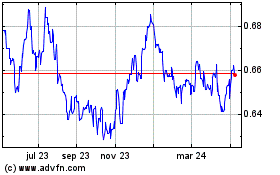Bank Of England Chief Bailey Signals Further Rate Hikes
01 Marzo 2023 - 2:59AM
RTTF2
Bank of England Governor Andrew Bailey said further increase in
the interest rate might be required to achieve the UK inflation
target on a sustainable basis.
At Brunswick Group's Cost of Living Conference in London, Bailey
said, "Some further increase in Bank Rate may turn out to be
appropriate, but nothing is decided."
"The incoming data will add to the overall picture of the
economy and the outlook for inflation, and that will inform our
policy decisions," the banker said.
Bailey cautioned against suggesting either that the bank is done
with increasing Bank Rate, or that policymakers will inevitably
need to do more.
The BoE has raised its benchmark interest rate by 390 basis
points since the current tightening cycle began in December
2021.
The governor said that the British economy evolved much as
expected since the February meeting. Inflation has been slightly
weaker, and activity and wages slightly stronger, with emphasize on
"slightly" in both cases, Bailey said.
Data from the central bank showed on Wednesday that mortgage
approvals declined for the fifth consecutive month in January. Home
loan approvals fell to 39,600 in January from 40,500 in
December.
If the onset of the Covid-19 pandemic and the period immediately
thereafter is excluded, this was the lowest approvals since January
2009, the BoE said.
The 'effective' interest rate, the actual interest rate paid on
newly drawn mortgages increased by 21 basis points, to 3.88 percent
in January.
Mortgage lending to individuals decreased to GBP 2.5 billion in
January from GBP 3.1 billion in the previous month.
Further, consumer credit doubled to GBP 1.6 billion from GBP 0.8
billion in December. The GBP 1.6 billion was split between GBP 1.1
billion of borrowing on credit cards and GBP 0.5 billion of
borrowing through other forms of consumer credit.
The big picture remains that in the current higher mortgage rate
environment, house prices are still too high for mortgage lending
to recover, Capital Economics' economist Andrew Wishart said.
Nationwide house price data released earlier in the day showed that
house prices registered the first annual fall since June 2020,
which was also the worst in a decade.
As squeeze on household income from higher interest rates and
inflation damped demand in the property market, house prices
declined 1.1 percent on a yearly basis in February, offsetting the
1.1 percent increase in January.
Elsewhere, data published by the British Retail Consortium
showed that shop price inflation hit a new record in February. Shop
prices increased 8.4 percent year-on-year after an 8.0 percent
increase in January.
AUD vs US Dollar (FX:AUDUSD)
Gráfica de Divisa
De Mar 2024 a Abr 2024

AUD vs US Dollar (FX:AUDUSD)
Gráfica de Divisa
De Abr 2023 a Abr 2024
